Iranian Banks Don’t Have Funds For Government-Mandated Loans
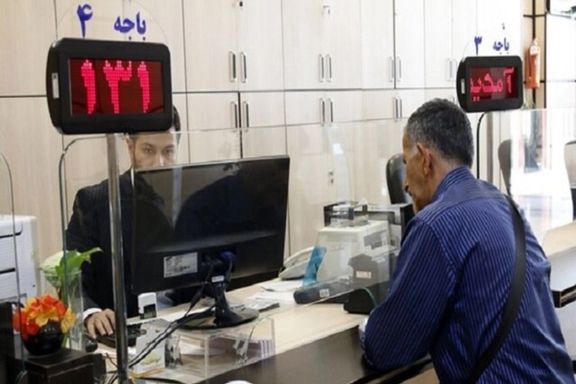
Iranian banks refuse to give government-mandated mortgages and loans to people, saying they don’t have the needed funds to comply with regulations.

Iranian banks refuse to give government-mandated mortgages and loans to people, saying they don’t have the needed funds to comply with regulations.
According to a report by Aftab news on Friday, loans to help people pay their mortgages and rents were ratified by the government and the ministry of roads and urban development but the Central Bank of Iran has sided with the banks that say they don’t have the necessary funds.
Some applicants say when they tell the banks that the ministry has approved the $2,800 loans, the banks reply that the ministry may have decided, but no one has provided funding for such loans.
Under heavy pressure to help citizens impoverished by current economic crisis, the government has made promises to help low-income citizens.
The government has also increased the amount of the “marriage loans” to increase the population – a favorite goal for the country’s Supreme Leader Ali Khamenei. The banks are told to offer $4,000 loans, but according to reports about 35 percent of applicants didn’t manage to receive any money.
The government has also proposed loans for childbearing in next year’s budget, with the amount increasing with each additional child.
According to Iran’s head of the Center for Strategic Research on Population, Iran has now the lowest birth rate in the Middle East after experiencing the fastest decline in births during the past three decades.

Turkey arrested eight people in an alleged Iranian plot to assassinate Israeli-Turkish businessman Yair Geller in revenge for killing of its nuclear scientist.
According to local media on Friday, the Turkish intelligence agency, MIT, shared the information with Mossad when they were certain about the assassination attempt.
The Iranian spy cell was comprised of nine operatives, some Iranian and some Turkish, who planned to kill the Istanbul-based tycoon, who owns an engineering company specializing in aerospace and defense technology.
The hit was planned as a retaliation for the killing of Mohsen Fakhrizadeh, who was known as the "father of Iran's nuclear weapons program" and was assassinated outside Tehran on November 26, 2020, in an operation widely attributed to Mossad.
The Turkish media reports say the hit squad followed Geller to his home and workplace and was planning to use Turkish citizens to carry out the assassination to avoid detection.
Following a months-long surveillance operation, eight out of nine members of the cell were arrested by the Turkish police. The ninth member, who was the squad’s leader in Iran, was identified as Yasin Taheremamkendi, purportedly with links to the Iranian intelligence agencies.
Turkish media reported Wednesday that the country’s intelligence had arrested 17 people allegedly linked to Iranian intelligence who were planning to kidnap an Iranian dissident.
Iran has been implicated in many assassinations, kidnappings and terror attacks abroad against dissidents and opponents.
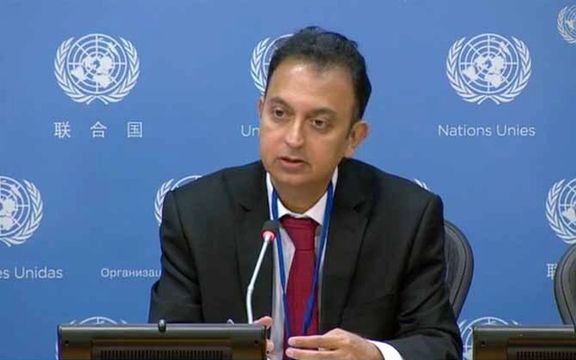
In a report provided to media this week, the United Nations Special Rapporteur on Iran has highlighted the detention of foreign and dual nations.
Javaid Rehman’s report was provided to the media this week. He will present the report to the United Nations Human Rights Council (UNHRC) between February 28 and March 3.
The report says that “many of those arbitrarily detained [in Iran] have serious underlying medical conditions that have been left untreated, or health conditions that have significantly deteriorated.” Rehman suggests the prisoners are a “means to put pressure on foreign governments."
Iran has always argued that those convicted by its courts have received due process and rejected Rehman’s earlier reports. Rehman, a professor at Brunel University, has not visited Iran since he was appointed in 2018, because Iran has banned UN and other human rights investigators from visiting the country.
Javaid’s focus in the report is on American, British, French, German, Austrian, and Swedish prisoners in Iran, several of whom were convicted by Revolutionary Courts on vague security charges after trials that do not meet international standards of due process. The accused often cannot choose their defense attorneys and they have no access to prosecution cases. Trials take place behind closed doors, and duration of detentions before trial are arbitrary. International human rights organizations have documented numerous instances of violations.
Javaid’s new report also expresses concern over threats against foreign-based journalists and their families inside the country and urged Iran to ensure that “human rights defenders…are not threatened with or subjected to intimidation, harassment, arbitrary arrest, deprivation of liberty or life or other arbitrary sanctions."
Rehman cites the case of Ahmadreza Djalali, an Iranian-Swedish emergency-medicine and disaster specialist, who he says was in prolonged solitary confinement after November 2020 and is in urgent need of surgery and dental care.
Rehman also urges Iran to conduct an “independent, impartial and transparent inquiry” over the 2019 fuel protests and to hold to account “all perpetrators of human rights violations” during those and other protests, including those in Khuzestan province and Esfahan in 2021.
The UN Special Rapporteur reports that in the first 11 months of 2021, at least 275 people were executed in Iran, including at least two under 18 at the time of their offence. He says that drug-related executions went up year-on-year during the 11 months and that there was an increase in executions of those from two non-Persian minority ethnicities, Baluchis and Kurds.
"The serious shortcomings in the legal framework and justice system, together with systemic violations of due process and fair trial, render most, if not all, executions in the Islamic Republic of Iran arbitrary deprivation of life," Rehman writes. The rapporteur highlights the case of Khezr Ghavidel, whose exoneration by the Supreme Court in July 2021 came nearly a year after his execution for drug offences.
In a response in October to a previous report from Rehman, Zahra Ershadi, Iran’s deputy ambassador to the UN, said such efforts aimed “to use human rights as an instrument against other countries" and that the rapporteur had used information provided by "terrorist groups" whose hands were “covered with blood.”
Ershadi said that Western countries, especially Canada, had pressed for Iran to be singled out as one of the few countries allocated such a rapporteur.
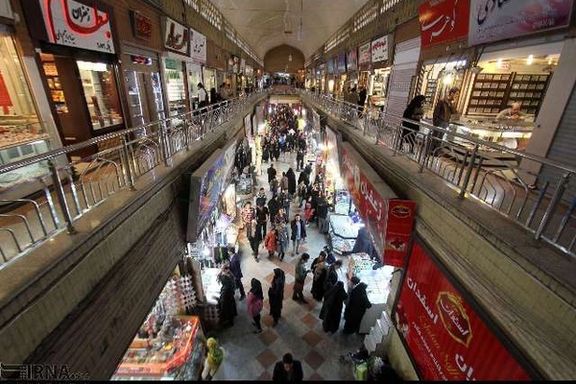
A recorded message against Iran’s Supreme Leader Ali Khamenei was broadcast on the public announcement system in Mashhad’s bazaar, videos in social media show.
Hossein Davari, governor of Iran’s second largest city and an important religious center, said that a recording on a USB device “was broadcast for a few seconds” in one part of the bazaar on Wednesday. He did not explain how the recording has reached the PA system.
People present in the bazaar have said that the PA system was hacked and for an extended time anti-Khamenei and anti-Khomeini messages were being broadcast.
In the videos loud voices are heard chanting “Death to Khamenei” and “Khomeini be damned”. Friday is the 43rd anniversary of Iran’s 1979 revolution led by Ayatollah Ruhollah Khomeini, a conservative cleric who established the Islamic Republic.
In repeated mass protests since 2017, demonstrators often chanted “Death to Khamenei” and “Death to the dictator”.
Hackers had recently penetrated the government-controlled state television, interrupting regular programming had broadcasting anti-regime messages. A group calling itself ‘Edalat-e Ali’, or ‘Ali’s Justice’ claimed responsibility. The hackers’ group had also penetrated Iran’s prison system last year and recently, accessing files and CCTV footage.
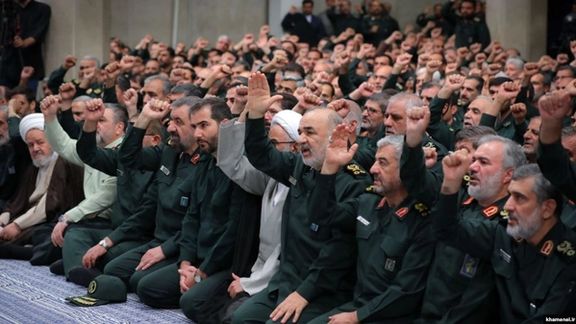
Iran’s Revolutionary Guard (IRGC) will get 20 trillion rials ($80 million) worth of crude oil to finish construction projects for the country’s prayer grounds.
The spokesman of the parliament's budget review committee, Rahim Zar’e, said on Wednesday that the barter has been approved by the committee.
IRGC’s Khatam-al Anbiya Construction Headquarters, which is the engineering arm of the IRGC and one of Iran's largest contractors in industrial and development projects, is set to allocate half of the amount to complete the construction of Grand Mosalla mosque of Tehran while the other half will be spent on similar projects across the country.
The Grand Mosalla (literally meaning prayer grounds or mosque) is a huge patch of land in Tehran that was proposed in 1982 to replace Tehran University as a location for the weekly Friday congregation. Its construction began in 1990 by the IRGC but the complex has not been completed and has largely served as a venue for exhibitions.
The administration of President Ebrahim Raisi is giving a lot of projects to different sections of the IRGC in return for crude oil that Tehran cannot sell due to sanctions, including a $3 billion project for rice production.
Involvement of the IRGC in business began in earnest two decades ago and has become a highly controversial issue in the country. Former president Hassan Rouhani in 2017 publicly criticized the practice and met a quick reaction by hardliners. He has to retract his statements at the time.
Iran has expanded barter to circumvent United States ‘maximum pressure’ sanctions, which threaten punitive action against any third party buying Iranian oil or dealing with Iran’s financial sector. Bartering oil for imports of animal feed and agricultural products has proved particularly viable.
The government has announced that 4.5 billion euros worth of crude oil will be put at the disposal of the armed forces to sell. This means the lion’s share will go to the IRGC, which must find middlemen and illicit ways to export the oil, giving rise to corruption.
Tehran’s city council has also announced its intention to hand over major projects to the Revolutionary Guard, despite serious allegation of large-scale corruption during the mayorship of a former IRGC general Mohammad Bagher Ghalibaf (2005-2017). He is now speaker of parliament
The same scenario happened during the administration of Mahmoud Ahmadinejad in the early 2010s, when for example the police was given oil to sell to provide for its needs. In the end it came to light that nearly $200 million in 2012 was never returned to the country.
A businessman, Babak Zanjani, who is now in jail with the death penalty hanging over his head, was a middleman selling oil during international sanctions also in the early 2010s. He failed to pay back at least $2.7 billion. His accomplices in the government were never identified. It would have not been easy for him to embezzle such a large amount of money without insider support.
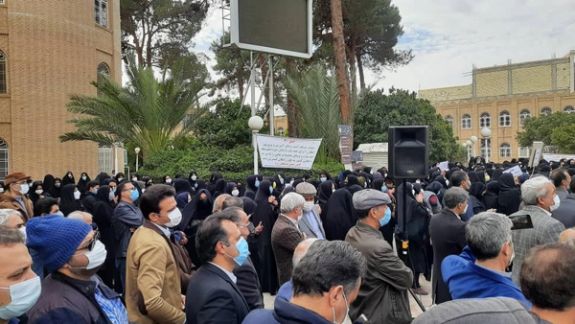
Iran’s education ministry has issued warnings to intimidate teachers and prevent them from participating in protests held regularly to demand higher pay.
The spokesman of teachers’ trade associations, which has organized several rounds of nationwide demonstrations, said on Thursday that the new directives are aimed at creating panic among the teachers, so they won’t hold more protests.
Mohammad Habibi revealed some copies of documents in his twitter account, saying that instead of responding to teachers' legitimate demands, education ministry officials have issued directives to school principals asking them to make sure that teachers are warned that attending rallies and sit-ins is against the law and they will face consequences if they take part in protests.
Teachers have planned to hold another round of protests and sit-ins from February 12 to 17 in many cities across the country.
During the latest round of the protests, teachers in 300 cities, town, and villages took part in the protests, and at least seven were arrested.
People from different walks of life, including nurses, firefighters, and even staff members of the judiciary department and prison guards, have held regular protest rallies or strikesto demand higher salaries.
Food prices have risen by more than 60 percent in recent months, on top of high inflation in the previous three years, while the government is unable to sufficiently boost wages as United States’ sanctions impede full capacity oil exports and international trade.